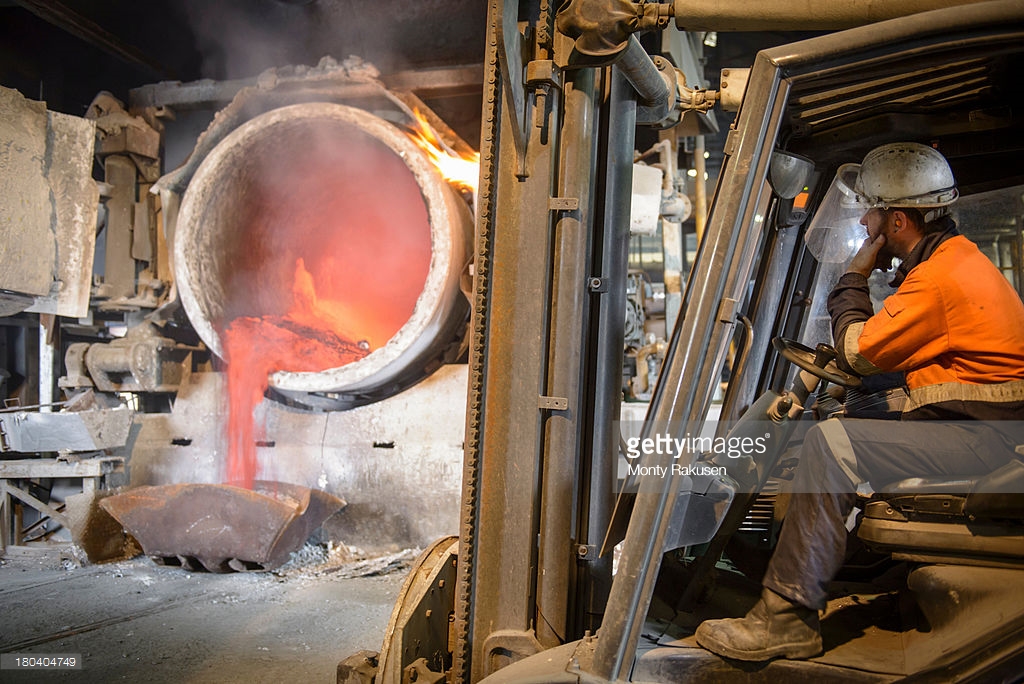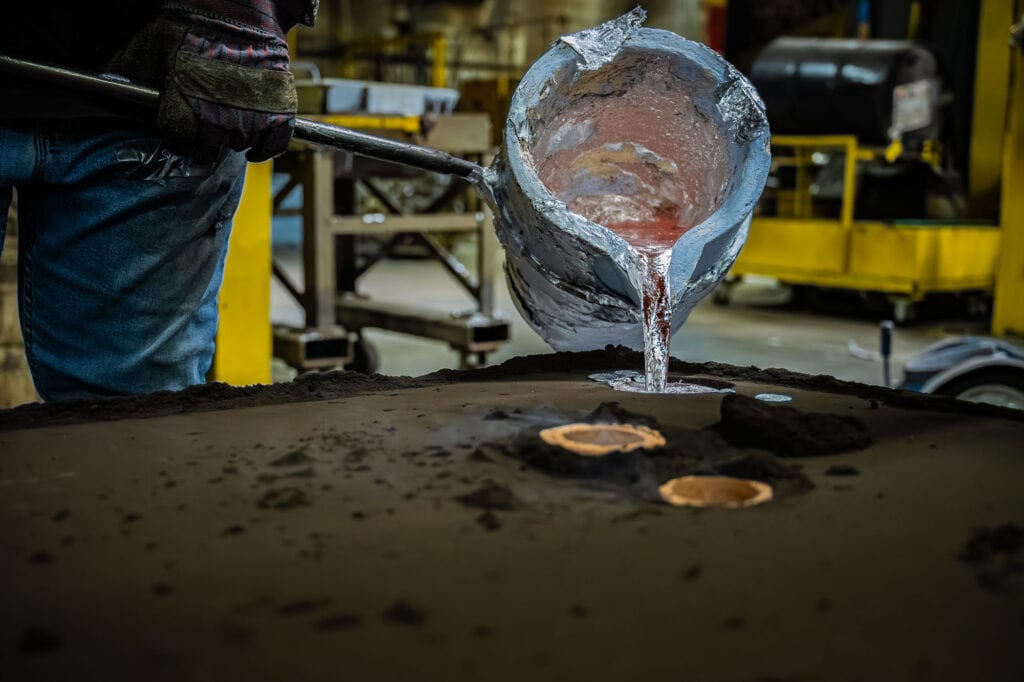How an Aluminum Foundry Produces High-Quality Casting Solutions for Industry
The Relevance of Aluminum Foundries in Sustainable Industrial Practices
Aluminum foundries are indispensable to sustainable commercial methods. They effectively reuse and generate aluminum, a product known for its green and light-weight residential properties. By implementing innovative modern technologies and eco-friendly energy, these foundries greatly decrease power use and exhausts. Furthermore, their recycling capabilities save natural deposits and foster a circular economic situation. As the need for lasting remedies expands, the role of aluminum foundries proceeds to develop, increasing essential questions about their future impact.
The Duty of Aluminum in Lasting Manufacturing
Several products are made use of in modern-day production, aluminum stands out due to its distinct homes that contribute to lasting methods. Its light-weight nature lowers power intake throughout transport and application, greatly lowering carbon impacts throughout different industries. Aluminum's resistance to deterioration extends its life expectancy, reducing the demand for substitutes and resource-intensive maintenance. In addition, it is very recyclable, with the capacity to keep its homes after multiple cycles, advertising a circular economic situation. This recyclability reduces the need for resources, conserving natural deposits and energy. In addition, aluminum can be produced with reduced greenhouse gas emissions compared to various other metals, especially when sourced from recycled material. As industries increasingly focus on sustainability, aluminum's convenience and green characteristics position it as a pivotal material in attaining greener manufacturing processes. Its role in lowering environmental impact highlights the importance of aluminum in contemporary commercial methods, aligning with global sustainability goals.
Energy Performance in Aluminum Foundries

Additionally, refining functional processes through automation and real-time monitoring can better enhance power management. Routine maintenance of devices warranties peak efficiency, while worker training on energy-saving methods cultivates a culture of sustainability within the labor force.
Investments in renewable resource sources, such as solar or wind power, additionally add to lowering the carbon footprint of aluminum foundries. By prioritizing energy efficiency, these centers not just reduced functional costs yet also play a crucial duty in cultivating a lasting commercial landscape, aligning with broader environmental goals.
Recycling and Resource Conservation
Recycling and source preservation play a necessary duty in the sustainability practices of aluminum foundries, enhancing energy performance efforts. Aluminum is one of one of the most recycled products around the world, with the recycling process calling for only 5% of the energy needed for key manufacturing. Foundries actively collect scrap aluminum from different resources, making and including post-consumer items waste, therefore minimizing the need for virgin material extraction. This practice not only saves natural deposits yet likewise reduces greenhouse gas exhausts related to mining and refining.
Furthermore, the closed-loop recycling system carried out by several foundries assurances that aluminum parts are recycled repetitively without destruction of high quality. This system enhances product efficiency and adds to a round economy. By prioritizing recycling and source conservation, aluminum foundries substantially alleviate their ecological influence while advertising lasting commercial practices that benefit both the economic climate and society.

Innovations in Aluminum Manufacturing Processes
Developments in aluminum manufacturing procedures are transforming the market, concentrating on reducing power consumption and enhancing efficiency. One notable innovation is the adoption of advanced smelting techniques, such as inert anode innovation, which greatly lowers greenhouse gas discharges while raising result quality. Furthermore, the integration of automation and man-made knowledge in production lines has streamlined procedures, permitting real-time surveillance and changes that maximize source use.
The growth of new alloys and composite products also boosts the mechanical properties of aluminum while preserving its lightweight qualities. Advancements in reusing techniques, including closed-loop systems, enable for the recovery of materials with very little waste. Furthermore, the implementation of sustainable power resources in aluminum smelting plants is coming to be increasingly common, straightening manufacturing with sustainability objectives. Collectively, these developments not just improve performance but likewise position the aluminum market as a leader in lasting production practices.

The Impact of Aluminum Foundries on Circular Economy
Aluminum foundries play a crucial role in fostering a circular economic climate by emphasizing the importance of material healing and reuse. By utilizing recycled aluminum, foundries greatly minimize the demand for virgin products, lessening environmental influence and preserving energy. The procedures employed in aluminum foundries allow for the effective improvement of scrap aluminum back right into high-grade ingots, which can be repurposed for brand-new products - Aluminum Foundry. This technique not only lowers carbon discharges but additionally reduces waste in garbage dumps, aligning with the concepts of sustainability
Moreover, aluminum's inherent residential or commercial properties-- such as light-weight and toughness-- boost product long life, decreasing the regularity of replacement. The assimilation of aluminum foundries within regional economic situations promotes job development and supports sustainable practices, as they typically work together with sectors concentrated on recycling and resource administration. On the whole, aluminum foundries are critical in progressing circular economy campaigns, confirming their worth in contemporary industrial methods.
Frequently Asked Concerns
Just How Do Aluminum Foundries Contribute to Work Development in Regional Areas?
Aluminum foundries add to work production in local communities by giving employment possibility throughout numerous skill degrees, enhancing regional economies through enhanced wages, and cultivating labor force advancement, eventually supporting click here lasting development and neighborhood resilience.
What Are the Environmental Effects of Aluminum Mining?
Aluminum mining notably influences the setting via logging, habitat destruction, and water contamination. The extraction process commonly leads to soil degradation and adds to greenhouse gas emissions, influencing local ecological communities and communities reliant on all-natural resources.
How Does the Price of Aluminum Compare to Other Metals?
Aluminum generally costs less than steels like copper and gold, yet even more than iron and steel (Aluminum Castings). Its price fluctuates based upon market need, production prices, and international financial conditions, impacting numerous markets and applications
What Accreditations Should Consumers Try To Find in Sustainable Aluminum Products?
Customers ought to look for qualifications such as the Aluminum Stewardship Initiative (ASI) qualification, ISO 14001 for ecological monitoring, and the Global Recycle Standard (GRS) to ensure sustainability in aluminum items, advertising liable sourcing and ecological stewardship.
How Can Services Evaluate the Sustainability of Their Aluminum Providers?
Services can assess the sustainability of aluminum providers by examining certifications, auditing methods, examining energy usage, and ensuring adherence to ecological guidelines. Teaming up with suppliers that prioritize eco-friendly processes is crucial for lasting operations.
As aluminum foundries undertaking to enhance their sustainability efforts, energy efficiency emerges as an important emphasis area. Investments in renewable power resources, such as solar or wind power, also contribute to lowering the carbon impact of aluminum foundries. Reusing and resource preservation play an important duty in the sustainability techniques of aluminum foundries, enhancing power performance efforts. By making use of recycled aluminum, foundries considerably minimize the need for virgin materials, lessening ecological influence and conserving energy. The procedures utilized in aluminum foundries allow for the reliable improvement of scrap aluminum back into high-grade ingots, which can be repurposed for brand-new products.